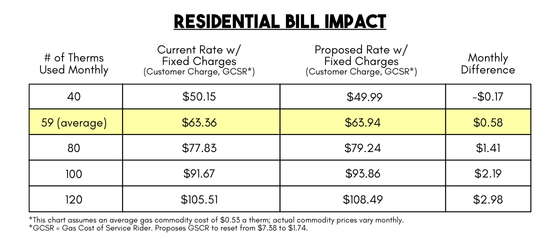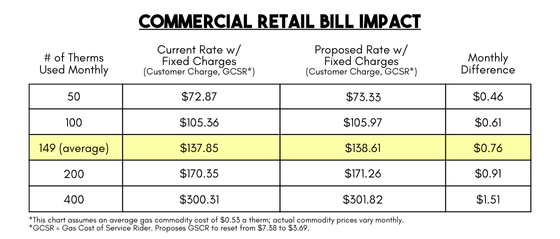On Monday, Nov. 18 at 1 p.m., at the Midwest Energy Hays office, Midwest Energy's Board of Directors approved the passage of a natural gas rate case, along with changes to language in electric and natural gas tariffs, to be effective Jan. 1, 2025. The new rates will ensure rates remain balanced across classes and keep tariff language up-to-date.
The rate case is nearly revenue-neutral for the company. Under the approved changes, an average residential customer will see their bill increase by less than 1 percent, or roughly 58 cents per month; an average commercial customer will see their bill increase by .55 percent, or roughly 76 cents per month. Most other customers will see slight decreases. While revenue from the Residential class will increase about $105,000 per year, revenue from other classes will decrease for a system-wide revenue reduction of about $12,000 per year.
Under the approved changes, the Gas Cost of Service Rider will be renamed the Gas Cost of Delivery Rider, and will be reset for all classes. For residential customers, this will result in a decrease from $3.48 per month down to $1.74 per month. The $900,000 annual cap on the Gas Cost of Delivery Rider will be eliminated, with future increases instead capped at 4.5 percent annually. These changes are consistent with our goals of keeping any increases under the rate of inflation. Lastly, language will be added to the Energy Cost Adjustment (ECA) and Purchased Gas Adjustment (PGA) for collecting revenue for reserves to hedge against wholesale energy prices and future capacity needs.
Informational public meetings were scheduled throughout the service territory, and all customers were invited to attend. The schedule of meetings is listed below:
Phillipsburg: October 24 @ Huck Boyd Community Center (860 Park St.) - 6 p.m.
Hays: October 29 @ BriefSpace (219 W. 10th) - 6 p.m.
Colby: October 30 @ City Limits Convention Center (2227 S. Range Ave.) - 6 p.m.
Scott City: November 7 @ Western Kansas Child Advocacy Center (212 E. 15th St.) - 6 p.m.
Open Meeting for the Board to consider and vote on the changes: November 18 @ Midwest Energy Office, Hays (1330 Canterbury Dr.) - 1 p.m.
Questions and Answers:
Q: Since there's no overall revenue increase, why are rate changes necesary?
A: The costs of capital improvements plus operating and administrative expenses have increased since the last general rate case in 2021. Annual adjustments such as the Gas Cost of Service Rider (proposed to become Gas Cost of Delivery Rider) adjusted automatically to cover property taxes and most capital additions. However, other expenses such as wages, vehicles, tools, and insurance are not covered by automatic riders. Every few years Midwest Energy changes its base rates to match those expenses. This proposal replaces the current base rate and riders with a formula rate resulting in an annual rate adjustment for the prior year’s capital additions and operating expense changes.
Q: What’s the purpose of the customer charge, and will it change?
A: The customer charge is intended to cover costs that vary more closely with the number of customers served rather than the amount of gas consumed. Examples include meters, regulators, yard lines, meter reading, billing and customer service functions. Under the rate change, the base residential customer charge will see no change while the Commercial customer charge will see an increase of $4 per month. All other rate classes will have an slight increase. The residential delivery charge would increase from 16 cents to 19.9 cents per therm.
Q: How much will my bill increase?
A: A cost-of-service study was performed by independent consultants to fairly assign costs across rate classes. Based on rate classification and consumption, the impact will vary – an overall bill may increase or decrease. A residential customer will see the following monthly bills (before taxes) for the indicated therms used, assuming a 53 cents per therm cost of gas:

Commercial retail customers will see the following bills (before taxes):

Q: Were changes made to any other rate schedules?
A: Yes, several electric and gas rate schedules are being revised. Click here to read all approved revisions to rate schedules and tariffs.
Q: When was the last rate increase?
A: Midwest Energy’s last general rate increase was in 2021. Midwest Energy works hard to control costs, and by employing cost-saving technology and improved procedures we have kept our rates stable for several years. However, a 2023 cost-of-service study revealed the need to update our rate structures.
Q: Who determines when a rate increase is necessary, and by how much?
A: Midwest Energy’s Executive Staff continuously monitors the financial stability of the cooperative and makes recommendations to the Board of Directors to determine if or when a rate increase is necessary. To establish the new rate structure, an independent, experienced firm was hired to review and recommend changes to our rates.
Q: How do Midwest Energy’s rates compare to other gas utilities in Kansas?
A: Midwest Energy’s Residential and Commercial natural gas delivery rates historically have consistently been the lowest in the state compared to the other Kansas gas utilities. As proposed, Midwest Energy’s Residential gas rates will remain among the lowest with Commercial rates still being the lowest compared to the other Kansas gas utilities.
Q: Will Midwest Energy still have a Cold Weather Rule to prevent service disconnection in the winter?
A: Yes. The rate changes don’t impact the Cold Weather Rule (CWR) for residential customers.
Q: When will the Board of Directors vote on these changes, and can I attend that meeting?
A: Midwest Energy's Board of Directors voted on and approved the proposed changes at an open public meeting held on Monday, Nov. 18 at 1 p.m. at the Midwest Energy offices, 1330 Canterbury Dr. in Hays. All Midwest Energy members were welcome to attend.
Q: What is the effective date of the new rates, and when would I see them on my bill?
A: The rates will go into effect with the first billing cycle based on meter readings beginning Jan. 1, 2025.
Q: How could customers make concerns known to the Board?
A: Customers may send comments regarding the rate changes to Justin MacDonald, VP of Customer Service by e-mail, or by calling him at 1-800-222-3121.